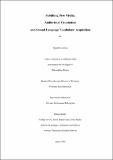| dc.contributor.advisor | Incalcaterra McLoughlin, Laura | |
| dc.contributor.author | Lertola, Jennifer | |
| dc.date.accessioned | 2014-01-14T17:19:32Z | |
| dc.date.issued | 2013-08 | |
| dc.identifier.uri | http://hdl.handle.net/10379/3979 | |
| dc.description.abstract | Promoting language learning is a long-term objective of the European Union with a view to fostering a comparable and improved proficiency among European citizens. To this end, European institutions have recognised the potential of subtitling - the active creation of subtitles by language learners - as an effective pedagogical tool in language learning. Subtitling is considered an innovative teaching strategy which involves language learners in an Audiovisual Translation task while exposing them to spoken dialogue in a foreign or second language. Subtitling can enhance language learning by improving language skills (listening, reading and writing) and transferable skills (such as digital literacy), facilitating mnemonic retention, and raising awareness of cultural and intercultural issues as well as pragmatic aspects of communication. In addition, it can prove highly motivating to learners. Although research on the subtitling practice is still limited, recent empirical studies have reported encouraging results on its use in Second Language Acquisition.
This thesis aims to contribute to shedding light on subtitling in the field of vocabulary acquisition while indicating possible directions for future research. It investigates the effects of subtitling on incidental vocabulary acquisition, in view of previous research and considering the central role of vocabulary knowledge in communicative competence and language learning. It is based on an experimental study carried out, after extensive piloting, with 25 Irish undergraduate students of Italian as a Foreign Language at the National University of Ireland, Galway, levels A1-A2 of the Common European Framework of Reference for Languages. By triangulating quantitative and qualitative methods, the main experimental study shows that interlingual subtitling promotes the incidental acquisition of new word meanings in terms of productive recall. While respecting a broad range of different preferences in learning styles, subtitling may be particularly suitable for learners with a kinesthetic preference. | en_US |
| dc.rights | Attribution-NonCommercial-NoDerivs 3.0 Ireland | |
| dc.rights.uri | https://creativecommons.org/licenses/by-nc-nd/3.0/ie/ | |
| dc.subject | Subtitling | en_US |
| dc.subject | Audiovisual Translation | en_US |
| dc.subject | Second Language Acquisition | en_US |
| dc.subject | Vocabulary | en_US |
| dc.subject | Italian | en_US |
| dc.title | Subtitling New Media: Audiovisual Translation and Second Language Vocabulary Acquisition | en_US |
| dc.type | Thesis | en_US |
| dc.contributor.funder | College of Arts, Social Sciences & Celtic Studies at NUI Galway - Galway Doctoral Research Fellowship | en_US |
| dc.description.embargo | 2017-11-01 | |
| dc.local.final | Yes | en_US |
| nui.item.downloads | 3709 | |


